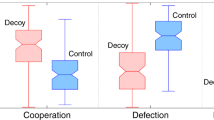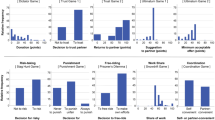Abstract
We experimentally investigate whether individuals can reliably detect cooperators (the nice(r) people) in an anonymous decision environment involving “connected games.” Participants can condition their choices in an asymmetric prisoners’ dilemma and a trust game on past individual (their partner’s donation share to a self-selected charity) and social (whether their partner belongs to a group with high or low average donations) information. Thus, the two measures of niceness are the individual donation share in the donation task, and the cooperativeness of one’s choice in the two games. We find that high donors achieve a higher-than-average expected payoff by cooperating predominantly with other high donors. Group affiliation proved to be irrelevant.
Similar content being viewed by others
References
Albert, M., & Heiner, R. A. (2003). An indirect-evolution approach to Newcomb’s problem. Homo Oeconomicus, 20, 161–194.
Andreoni, J., & Samuelson, L. (2006). Building rational cooperation. Journal of Economic Theory, 127, 117–154.
Berg, J., Dickhaut, J. W., & McCabe, K. A. (1995). Trust, reciprocity, and social history. Games and Economic Behavior, 10, 122–142.
Bolton, G. E., Katok, E., & Zwick, R. (1998). Dictator game giving: Rules of fairness versus acts of kindness. International Journal of Game Theory, 27, 269–299.
Bornstein, G., Winter, E., & Goren, H. (1996). Experimental study of repeated team-games. European Journal of Political Economy, 12, 629–639.
Clark, K., & Sefton, M. (2001). The sequential prisoner’s dilemma: Evidence on reciprocation. Economic Journal, 111, 51–68.
Congleton, R. D., & Vanberg, V. J. (2001). Help, harm or avoid? On the personal advantage of dispositions to cooperate and punish in multilateral PD games with exit. Journal of Economic Behavior and Organization, 44, 145–167.
Croson, R., Fatas, E., & Neugebauer, T. (2005). Reciprocity, matching and conditional cooperation in two public goods games. Economics Letters, 87, 95–101.
Fischbacher, U., Gáchter, S., & Fehr, E. (2000). Are people conditionally cooperative? Evidence from a public goods experiment. Economics Letters, 71, 397–404.
Frank, R. H. (1987). If homo oeconomicus could choose his own utility function, would he want one with a conscience? American Economic Review, 77, 593–604.
Frey, B. S., & Meier, S. (2004). Social comparisons and pro-social behavior. Testing ‘conditional cooperation’ in a field experiment. American Economic Review, 94, 1717–1722.
Gáchter, S. (2006). Conditional cooperation: Behavioral regularities from the lab and the field and their policy implications. CeDEx Discussion Paper No. 3. University of Nottingham.
Gúth, W., & Kliemt, H. (2000). Evolutionarily stable co-operative commitments. Theory and Decision, 49, 197–221.
Johnson, P., Levine, D. K., & Pesendorfer, W. (2001). Evolution and information in a gift-giving game. Journal of Economic Theory, 100, 1–21.
Kirchler, E., Rodler, C., Hólzl, E., & Meier, K. (2001). Conflict and decision making in close relationships. Hove, UK: Psychology Press.
Levati, M. V., & Neugebauer, T. (2004). An application of the English clock market mechanism to public good games. Experimental Economics, 7, 153–169.
Levine, D. K. (1998). Modeling altruism and spitefulness in experiments. Review of Economic Dynamics, 1, 593–622.
Mikula, G., & Uray, H. (1973). Die Vernachlássigung individueller Leistungen bei der Lohnaufteilung in Sozialsituationen. Zeitschrift fúr Sozialpsychologie, 4, 136–144.
Muller, A., & Sadanand, A. (2003). Order of play, forward induction, and presentation effects in two-person games. Experimental Economics, 6, 5–25.
Okunade, A. A., Wunnava, P. V., & Walsh, R. (1994). Charitable giving of alumni: Micro-data evidence from a large public university. American Journal of Economics and Sociology, 53, 73–84.
Rai, S. N., & Gupta, M. D. (1996). Donating behaviour as a function of age, culture and outcome feedback conditions. Psycho-Lingua, 26, 105–110.
Sainty, B. (1999). Achieving greater cooperation in a noisy prisoner’s dilemma: An experimental investigation. Journal of Economic Behavior and Organization, 39, 421–435.
Scharpf, F. (1997). Games real actors play: Actor-centered institutionalism in policy research. Boulder: Westview.
Seinen, I., & Schram, A. (2006). Social status and group norms: Indirect reciprocity in a repeated helping experiment. European Economic Review, 50, 581–602.
Smith, E. R., & Mackie, D. M. (2000). Social psychology 2nd ed. Philadelphia: Psychology Press.
Tajfel, H. (1969). Cognitive aspects of prejudice. Journal of Social Issues, 25, 79–97.
Weber, R., & Camerer, C. (2004). Timing and virtual observability in ultimatum bargaining and ‘weak link’ coordination games. Experimental Economics, 7, 25–48.
Author information
Authors and Affiliations
Corresponding author
Additional information
JEL Classification C91, C72, D3
Electronic supplementary material
Rights and permissions
About this article
Cite this article
Albert, M., Güth, W., Kirchler, E. et al. Are we nice(r) to nice(r) people?—An experimental analysis. Exp Econ 10, 53–69 (2007). https://doi.org/10.1007/s10683-006-9131-3
Received:
Revised:
Accepted:
Published:
Issue Date:
DOI: https://doi.org/10.1007/s10683-006-9131-3




